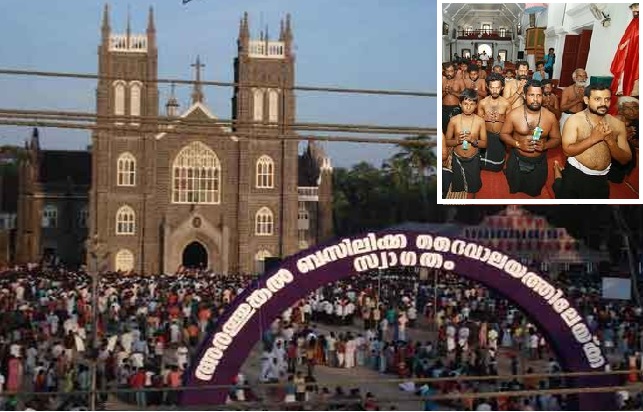When a Hindu Deity’s Muslim-Christian Friendship Sets A Pilgrim Tradition In Kerala

Thiruvananthapuram: Can you imagine Hindu devotees circumambulating a mosque in their ritual attire and taking bath in a church pond as part of their annual temple pilgrimage? This is not a fairy tale of religious harmony but a real-life scene in Kerala where pilgrims of the famed Sabarimala Lord Ayyappa Temple visit a mosque and church as part of the annual Mandalam-Makaravilakku pilgrimage.
Both the Erumeli Nainar Juma Masjid, also known as Vavar Palli (mosque), in Kottayam district and Arthunkal St Andrew's Basilica in neighbouring Alappuzha have been opening its portals for the devotees of Lord Ayyappa for decades during the two-month-long pilgrim season beginning in mid-November.
Wearing the traditional black dress and bead-chain and smearing 'bhasmam', the holy ash, on forehead, chest and arms, Hindu pilgrims visit the mosque and the church every year and offer prayers, reviving the local myth of the Lord Ayyappa's friendship with a Muslim youth and a Christian priest.
It is heartening to see how the managements of the mosque and church wholeheartedly welcome and provide facilities for the Hindu pilgrims who step in chanting aloud 'swamiye saranam Ayyappa' mantras praising their deity.
According to local lore, Vavar, for whom the mosque is dedicated, was the Muslim companion of Lord Ayyappa, the adopted son of the erstwhile Pandalam king as per Hindu belief.
The Arthunkal church legends stated that one of its erstwhile vicars, popularly known as Arthunkal Veluthachan (fair-skinned father) among local people, had been a great friend of Ayyappa.
Even when the country had witnessed tensions in the name of religion and belief, this temple, church and mosque stood as a unique example of deep-rooted communal harmony in Kerala.

According to Hakim, joint secretary, Erumeli Mahalla Muslim Jama-ath, not only Keralites but devotees from neighbouring states of Tamil Nadu, Karnataka and Andhra Pradesh also visit the Vavar mosque, situated over 60 km from Sabarimala, every year and offer prayers before they start trekking the hill shrine.
"A large number of Ayyappa pilgrims visit the mosque throughout the November-January annual pilgrim season. They do not enter the prayer hall but circumambulate the mosque, provide kanikka (offering) and break coconut at the premises," hesaid.
"It is beautiful to see when we perform namaz inside the hall, our Hindu brothers perambulate the mosque and offer prayers as part of their traditional believes. The legend of the friendship of Ayyappa and Vavar is the reflection of the deep-rooted secularism and communal harmony in Kerala," he said.
The Jama-ath, which takes care of the administration of the centuries-old mosque, provides parking facilities and space for placing 'viri' (bed spread) for the ‘Ayyappas', how the Sabarimala pilgrims are generally known as.
The Nainar Juma Masjid also conducts an annual festival named 'Chandanakudam' as a prelude to the 'pettathullal', the ceremonial mass dance of Ayyappa devotees, at the end of the yearly pilgrim season.
Interestingly, there is a place at Sabarimala known as 'vavar nada', dedicated to the 'Vavarswamy', how the Muslim friend of Ayyappa is fondly being called by Hindu devotees.
Meanwhile, Fr Christopher M Arthasseril, the parish priest of Arthunkal Basilica, said it has for long been a custom for the sea-side church to receive the Sabarimala pilgrims.

After offering prayers at Sabarimala, a large number of Ayyappa devotees visit the 16th-century Arthunkal Basilica, built by Portuguese missionaries, to take out their ‘mala' (bead-chain) worn as part of the pilgrimage.
"Majority of the pilgrims visit the church to remove the traditional bead-chain marking the end of their 41-day vrata (renunciation of worldly pleasures)," Fr Arthasseril told PTI.
After removing the chain by paying respect before the idol of Saint Sebastian, the devotees take a bath in a tank in the church premises or a dip in the sea, he said.
Detailing the legend behind the church's Sabarimala connection, the priest said the visit of the pilgrims commemorate the bond between Lord Ayyappa and a Jesuit priest, one of the early vicars of the church.
"The legend linking Sabarimala and Arthunkal Church has been attributed to Fr Jacomo Fenicio, a Jesuit who had served as the vicar of the church from 1584. As per the records, he had great interest and knowledge in Hindu culture and traditions and also in local martial arts like Kalaripayattu," he said.
The local legend was that the priest, believed to have magical powers to heal diseases, was a friend of Lord Ayyappa, the adopted son of Pandalam king. Many had even considered them as brothers, as per the lore.
The priest said they used to clean the temple pond before the Sabarimala season and provide other necessary arrangements to host Ayyappa pilgrims.
However, both the mosque and church authorities admitted that the devastation caused by the August deluge and the intense protests by devotees and right-wing groups against the implementation of the Supreme Court verdict permitting women of all age groups at the hill shrine have affected the pilgrim inflow.(PTI)
Also Read: Can Congress Offer A Clear Alternative To BJP’s Quasi-Religious Politics?


























